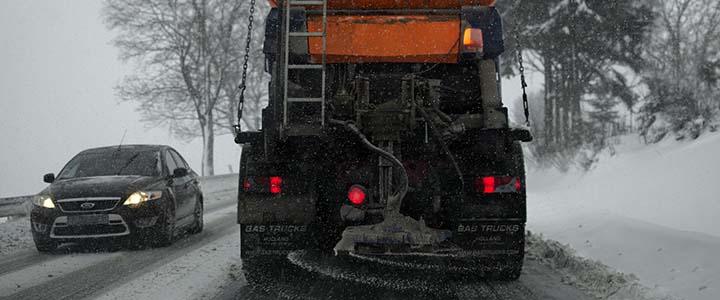
Road Salt and Drinking Water
New Hampshire has a problem with salt. We use too much of it. Far too much. Salt, on a molecular level, is composed of sodium and chloride in equal parts. So while your doctor may urge you to cut back on sodium because it can increase blood pressure and the risk of heart disease and stroke, our lakes, rivers, streams and groundwater are being polluted by sodium’s counterpart – chloride. Chloride has adversely affected freshwater by making it uninhabitable for many species. In 2020, New Hampshire listed 50 chloride-impaired water bodies.
Now we are seeing the affects within our drinking water. “Many wells are impacted,” said Cindy Klevens, a water treatment engineer with DWGB. The increase in sodium and chloride in groundwater in New Hampshire between 1960 to 2011, particularly in Rockingham and Belknap counties, has been significant, as reported by U.S.G.S. (Open File Rpt., 2012-1236). Although chlorides are not necessarily harmful to humans, they are highly corrosive. High concentrations of chloride can lead to degradation of pipes, and the leaching of lead, something many people will remember from the Flint, Michigan water disaster. Although the state regulates public drinking water closely, officials recognize an immediate need to address this problem at its largest source – road salt.
Enter the Green SnowPro (GSP) Program. The GSP Program began in 2013, built in partnership with NHDES, NHDOT, UNH, and state legislators. Its sole aim is to train snow and ice contractors how to adopt best management practices that reduce road salt usage while keeping the public safe. In return, contractors are given a certification that affords them Limited Liability Relief (LLR). LLR can protect them from slip-and-fall claims, an unfortunate reality for the industry. Contractors learn how to calibrate their equipment, use proper application rates, use brine, and a litany of other useful techniques. Although the LLR has proven to be a driver for many participants, dozens of contractors have noticed significant reductions in annual costs. It is estimated that 50 to 75% more salt is used for deicing than is necessary. Calibration of equipment alone can reduce salt usage up to 50%.
If you are or anyone you know is interested in becoming a Green SnowPro contractor, email salt@des.nh.gov or call (603) 271-5329. Visit the NHDES road salt webpage for the current list of approved GSP contractors.




